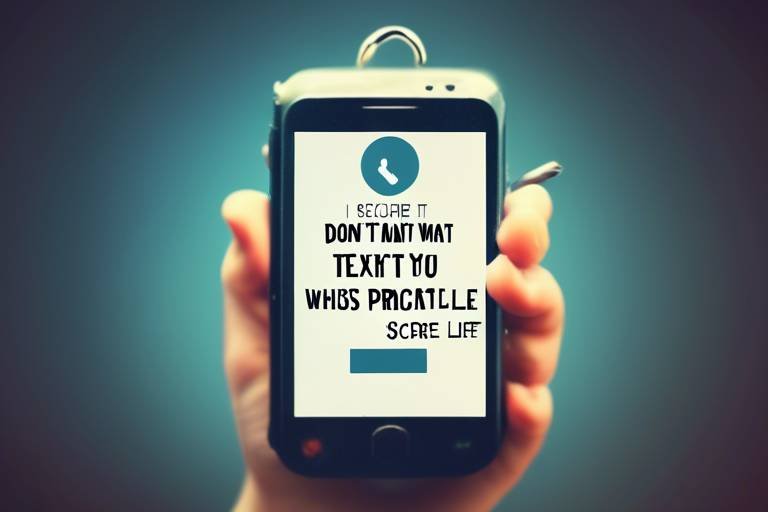How to Protect Your Relationship Privacy on Social Media
In today's digital world, where sharing every moment has become second nature, protecting your relationship privacy on social media is more important than ever. Imagine walking through a crowded market, holding hands with your partner, but every passerby can overhear your private conversations. That’s what oversharing on social media can feel like! It’s essential to strike a balance between sharing joyful moments and maintaining the intimacy that makes your relationship special. This article dives deep into practical strategies that will help you safeguard your relationship while navigating the complex landscape of social media.
First things first: understanding privacy settings is crucial. Each social media platform has its own set of privacy controls that allow you to dictate who gets to see your posts. Have you ever thought about how many people can see your relationship updates? It can be overwhelming! Take a moment to explore the privacy settings on the platforms you use. Here’s a quick overview of what you should look for:
| Platform | Key Privacy Settings |
|---|---|
| Adjust audience for posts, limit past posts, and manage friend lists. | |
| Set your account to private, control who can comment, and restrict accounts. | |
| Protect your tweets, control who can tag you, and manage followers. |
By familiarizing yourself with these settings, you can ensure that only the people you trust have access to your relationship moments. Remember, it’s not just about what you share, but also who gets to see it!
Effective communication is the backbone of any strong relationship, especially when it comes to social media. Have you and your partner discussed what’s okay to share and what’s off-limits? Establishing clear boundaries can prevent misunderstandings and ensure that both of you feel comfortable with the online portrayal of your relationship. It’s all about mutual respect! You might want to consider discussing:
- What types of posts are acceptable?
- Which moments should remain private?
- How to handle comments from friends and family about your relationship posts.
Having these conversations can help both partners feel secure and respected, allowing you to enjoy your relationship without the anxiety of overexposure.
When it comes to social media, not every moment needs to be shared. It’s vital to have discussions about which experiences are appropriate to post publicly. Think of it like curating a gallery of your relationship; you want to showcase the highlights without revealing everything. Are there special occasions that deserve a post, or are there everyday moments that are better kept just between the two of you? Finding common ground on shareable moments can enhance your connection and ensure you both feel valued.
Every relationship has its sensitive topics, and social media can sometimes amplify these issues. It’s important to recognize what subjects might cause discomfort for either partner. For instance, discussing past relationships or personal struggles might not be suitable for public consumption. By identifying these sensitive areas, you can avoid potential conflicts and protect the emotional well-being of both partners.
Ever felt the urge to post something in the heat of the moment, only to regret it later? Creating a posting schedule can help you manage what and when to share about your relationship. Think of it as planning a meal; you wouldn’t throw random ingredients together without a recipe, right? Establishing a thoughtful approach to sharing can minimize impulsive posts and keep your relationship narrative consistent and meaningful.
Keeping an eye on each other's online presence doesn’t mean you’re being controlling; rather, it’s about being aware of what your partner is sharing. Discussing your online activity can open up conversations about privacy and comfort levels. If you notice something that makes you uncomfortable, it’s essential to address it constructively. Just like in any partnership, transparency is key!
Who you allow to see your posts can significantly impact your relationship privacy. It’s a good practice to regularly review your friend lists and adjust them as needed. Are there acquaintances who don’t need to see your relationship milestones? Or perhaps some friends who might not respect your boundaries? Managing your friend lists ensures that only trusted individuals have access to your shared moments, creating a safer online space for your relationship.
Consider utilizing private groups for sharing relationship updates. This can be a great way to keep your closest friends and family in the loop without exposing your relationship to everyone. Setting up a private group is easy and can foster a sense of community without sacrificing intimacy. You can share your joys, milestones, and even challenges in a controlled environment, allowing for supportive feedback from trusted individuals.
Sometimes, blocking certain individuals is necessary to protect your relationship. If someone is consistently disrespectful or intrusive regarding your relationship, it’s okay to take action! Identifying and dealing with unwanted contacts can help maintain the peace and privacy you desire. Remember, your relationship is a sanctuary, and you have the right to protect it from negativity.
Q: How can I discuss privacy concerns with my partner?
A: Start with an open and honest conversation about your feelings. Share specific examples and listen to your partner's perspective to find common ground.
Q: Is it okay to share relationship milestones on social media?
A: Yes, as long as both partners agree on what to share and feel comfortable with it.
Q: What should I do if my partner overshares?
A: Approach the topic gently, expressing your concerns and suggesting boundaries that work for both of you.

Understanding Privacy Settings
In today's digital landscape, where every moment is just a click away from being shared, understanding privacy settings on social media is more crucial than ever. Imagine your relationship as a beautiful garden; you wouldn’t want just anyone trampling through it, right? Similarly, knowing how to protect your relationship's privacy means you can cultivate that garden without interference. Every social media platform offers a variety of settings that allow you to control who sees your posts, comments, and even your relationship status. This control is essential in maintaining the intimacy you cherish.
First things first, let's dive into the basics. Each platform has its own set of privacy options, and familiarizing yourself with them can feel overwhelming. However, taking the time to explore these settings can significantly enhance your relationship's security. For instance, Facebook allows you to customize your audience for every post. You can choose to share with just friends, specific friends, or even make a post public. By adjusting these settings, you can ensure that only those you trust have access to your relationship updates.
Here's a quick breakdown of what to look for in privacy settings on popular platforms:
| Platform | Key Privacy Settings |
|---|---|
| Custom audience for posts, profile visibility options, and friend list management. | |
| Private accounts, story sharing settings, and close friends lists. | |
| Protected tweets and follower approval settings. |
Next, don't forget about the importance of regularly reviewing these settings. Just like a garden needs regular upkeep, your social media privacy requires ongoing attention. Social media platforms frequently update their features, which can alter your privacy settings without your knowledge. Set a reminder to check your settings every few months, or whenever you notice a new feature being rolled out. This practice not only keeps your information secure but also allows you to make informed decisions about what to share.
Moreover, it’s not just about adjusting settings on your own account; it’s equally important to discuss these privacy measures with your partner. Having an open conversation about how you both want to manage your online presence can lead to a stronger bond. You might find that you both have different comfort levels regarding what to share. For instance, while one partner may be okay with posting pictures from a recent vacation, the other might prefer to keep that moment private. Establishing a mutual understanding can prevent misunderstandings and help you navigate the social media landscape together.
So, as you embark on this journey of understanding and adjusting your privacy settings, remember that the goal is to create a safe space for your relationship. By taking control of your online presence, you can ensure that your relationship remains a cherished secret garden, away from prying eyes.

Communicating Boundaries
In the world of social media, where everything seems to be just a click away, in a relationship is more essential than ever. It's not just about what you share; it's about how it makes both partners feel. Have you ever posted something only to realize later that your partner was uncomfortable with it? This is why having a clear conversation about what’s acceptable to share online is crucial. When both partners openly discuss their feelings about social media, it fosters a sense of trust and respect.
Start by asking each other some important questions. For instance, what types of posts feel okay to share? Are there moments that should remain private? It's essential to create a safe space where both of you can express your thoughts without judgment. Remember, it’s not just about your comfort; it’s about your partner's feelings too. This mutual understanding can significantly enhance your relationship's intimacy.
When discussing boundaries, it’s helpful to consider the following aspects:
- What to Share: Decide together which milestones, events, or everyday moments are worthy of a post.
- How Much to Share: Discuss whether you prefer to keep details private, like intimate conversations or conflicts, to avoid misunderstandings.
- Who to Share With: Determine if certain friends or family members should have access to your relationship updates.
By establishing these boundaries, you’re not just protecting your relationship; you’re also setting the stage for healthy communication. Think of it like building a fence around your garden; it keeps out unwanted visitors while allowing you to enjoy the beauty within. If either partner feels uncomfortable with what’s being shared, it’s vital to revisit these discussions and make adjustments as needed. Remember, boundaries are not set in stone; they can evolve as your relationship grows.
Additionally, creating a posting schedule can be beneficial. This doesn’t mean you have to stick to a strict timetable, but having a general idea of when and what to share can prevent impulsive posts that might upset your partner. It’s like planning a meal together; you wouldn’t want to serve something that one of you dislikes!
In essence, communicating boundaries is about mutual respect and understanding. It’s about ensuring both partners feel safe and valued in the relationship. So, take the time to talk it out, find common ground, and enjoy the journey of sharing your lives together—both online and offline.

Discussing Shareable Moments
This article explores essential strategies for safeguarding your relationship privacy in the digital age, providing practical tips and insights to maintain intimacy while navigating social media platforms.
Familiarizing yourself with privacy settings on social media platforms is crucial. This section will guide you through adjusting these settings to control who sees your relationship-related posts and information.
Effective communication is key in any relationship. Here, we discuss how to establish and maintain boundaries regarding what to share on social media, ensuring both partners feel comfortable and respected.
When it comes to sharing moments from your relationship on social media, it's not just about what you want to post; it's about what both partners feel comfortable sharing. Imagine your relationship as a beautiful canvas—each post is a stroke of color that adds to the overall picture. But, just like an artist, you need to decide which colors to use and when to apply them. Open discussions about shareable moments can help you both understand each other's perspectives and preferences.
Start by having a candid conversation about what types of moments are significant to you both. For instance, you might find that while one partner loves sharing celebratory milestones, like anniversaries or vacations, the other may prefer to keep intimate moments private. It's essential to establish a mutual understanding of what feels right to share publicly and what should remain within the confines of your private lives. This not only fosters respect but also strengthens your bond.
To facilitate this discussion, consider these key points:
- Milestones: Birthdays, anniversaries, and achievements can be shared, but ensure both partners agree on the specifics.
- Daily Life: Casual updates about your day-to-day activities can be fun, but be mindful of how much you reveal.
- Personal Moments: Intimate moments, such as feelings or conflicts, should generally be kept off social media to maintain privacy and respect.
By creating a list of shareable moments that both partners are comfortable with, you can avoid misunderstandings and potential conflict. This proactive approach can turn social media sharing into a delightful experience rather than a source of tension. Remember, the goal is to celebrate your relationship without oversharing or compromising each other's comfort.
Certain topics may be sensitive for one or both partners. This section highlights how to recognize and avoid sharing information that could lead to discomfort or conflict.
Establishing a posting schedule can help manage what and when to share about your relationship. This strategy promotes thoughtful sharing and minimizes impulsive posts.
Keeping an eye on each other's online presence can help maintain privacy. This subheading covers the importance of being aware of what your partner shares and how to discuss any concerns.
Who you allow to see your posts can impact your relationship privacy. This section discusses best practices for managing friend lists to ensure only trusted individuals have access to your shared moments.
Utilizing private groups for sharing relationship updates can enhance privacy. This subheading explains how to set up and manage these groups effectively.
Sometimes, it's necessary to block certain individuals to protect your relationship. This section outlines how to identify and deal with unwanted contacts on social media platforms.
Q: How can I talk to my partner about what to share on social media?
A: Start by expressing your feelings and preferences openly. Ask your partner about their comfort levels and discuss any boundaries together.
Q: What should I do if my partner shares something I'm uncomfortable with?
A: Communicate your feelings honestly and respectfully. Discuss why the post makes you uncomfortable and work together to find a solution.
Q: Are there any specific types of posts I should avoid?
A: Yes, avoid sharing personal conflicts, sensitive topics, or anything that could embarrass your partner. Always prioritize mutual respect.

Identifying Sensitive Topics
In any relationship, there are certain topics that can be sensitive and may lead to discomfort or conflict if shared publicly on social media. It's essential to recognize these topics to protect your relationship and maintain a healthy dynamic. Think of it like navigating a minefield; one wrong step can lead to an explosion of emotions. So, how do you identify these sensitive areas?
First and foremost, having open conversations with your partner about what they consider private is crucial. Some individuals may feel uncomfortable sharing details about their family issues, financial struggles, or past relationships. By discussing these topics, you can gain a clearer understanding of what should remain behind closed doors. Remember, it’s all about creating a safe space for both partners.
Another approach is to reflect on past experiences. Have there been instances where sharing something seemed to upset your partner? If so, take note of those moments. It’s like creating a map of sensitive areas to avoid in the future. You can also consider the following categories that often contain sensitive topics:
- Family Dynamics: Discussions about family issues or conflicts.
- Financial Matters: Sharing details about income, debts, or spending habits.
- Previous Relationships: Talking about ex-partners or past romantic experiences.
- Personal Struggles: Issues related to mental health, addiction, or personal failures.
Additionally, it’s wise to pay attention to your partner's non-verbal cues. If they seem hesitant or uncomfortable when a specific topic arises, it might be best to steer clear of that subject in a public forum. Think of it as reading the room; being attuned to each other's feelings can help you both navigate the tricky waters of social media sharing.
Lastly, creating a mutual agreement on what to share can significantly reduce the risk of crossing boundaries. Establishing guidelines together can empower both partners to feel secure in their relationship. After all, social media should enhance your connection, not jeopardize it. By identifying sensitive topics, you can ensure that your relationship remains a source of joy and intimacy, rather than a battleground for misunderstandings.
- What are some common sensitive topics to avoid on social media? Common sensitive topics include family issues, financial matters, and past relationships.
- How can I communicate with my partner about sensitive topics? Open and honest conversations are key. Discuss what each of you considers private.
- Why is it important to identify sensitive topics? Identifying sensitive topics helps maintain trust and respect in the relationship, avoiding unnecessary conflict.

Creating a Posting Schedule
In today’s fast-paced digital world, it’s easy to get caught up in the moment and share every little detail about your relationship on social media. However, this can lead to oversharing, which might make both partners feel uncomfortable. That’s where creating a posting schedule comes into play. By establishing a thoughtful plan for what and when to share, you can both enjoy the benefits of social media while protecting your relationship's privacy.
Think of a posting schedule as a roadmap for your online presence. It helps prevent those impulsive moments when you might feel the urge to post something without considering how it could affect your partner. Start by discussing with your partner what types of moments are meaningful enough to share. Are those cute date nights or milestone celebrations? Or maybe it’s a fun trip you took together? By identifying these moments, you can create a schedule that allows for intentional sharing.
To make this process easier, consider using a simple table to outline your posting schedule. Here’s a quick example:
| Date | Event | Platform | Notes |
|---|---|---|---|
| March 10 | Anniversary Dinner | Share a photo with a heartfelt caption | |
| April 5 | Weekend Getaway | Post a group photo with friends | |
| May 20 | New Pet Adoption | Share a cute photo of the pet |
This table not only helps you plan your posts but also allows both partners to agree on what’s being shared and when. Remember, it's essential to keep the lines of communication open. If one partner feels uncomfortable about a particular post, it’s crucial to respect that feeling and adjust accordingly. Flexibility is key!
Additionally, you might want to designate certain days as "no-post days" where you both agree to take a break from sharing personal moments online. This can help in nurturing your relationship without the added pressure of social media. Think of it as a mini digital detox that allows you to focus on each other without distractions.
In conclusion, creating a posting schedule is a proactive way to maintain your relationship privacy while still enjoying the benefits of social media. By planning your posts together, you can ensure that your shared moments are celebrated without compromising your intimacy and comfort. So, grab a calendar and start mapping out those special occasions together!

Monitoring Online Activity
In today's digital landscape, keeping tabs on your partner's online activity can feel a bit like walking a tightrope. You want to ensure that your relationship remains private and secure, but you also don't want to come off as overly controlling or intrusive. So, how do you strike that balance? First and foremost, it’s essential to foster an environment of trust and transparency. Regularly discussing your online activities with each other can help both partners feel more at ease and aware of what’s being shared.
One effective strategy is to set aside time to review each other's social media profiles together. This can be a casual and fun activity, where you both can discuss posts, comments, and interactions. It’s not about policing each other but rather about sharing and understanding how you both navigate the online world. By doing this, you can identify any potential issues before they escalate. For instance, if one partner notices a friend commenting excessively on their posts, it might be worth discussing whether that makes them uncomfortable.
Another aspect of monitoring online activity involves being aware of the privacy settings on various platforms. Each social media site has different features that allow you to control who sees what. Familiarizing yourself with these settings can empower both partners to manage their profiles more effectively. For example, consider creating custom friend lists that can limit who sees your relationship-related posts. This way, you can share special moments with close friends and family without broadcasting them to the entire world.
Additionally, you should keep an open line of communication about your feelings regarding online interactions. If something bothers you, such as a partner liking a post from an ex or engaging with someone in a way that feels uncomfortable, it’s crucial to address it directly. Avoiding these conversations can lead to misunderstandings and resentment. Instead, approach the topic with curiosity rather than accusation. You might say something like, “I noticed you liked that photo from your ex; how do you feel about that?” This invites a dialogue rather than putting your partner on the defensive.
Lastly, remember that monitoring online activity should never feel like a chore or a burden. It’s about enhancing your relationship and ensuring both partners feel valued and respected. By making it a joint effort, you can both enjoy the benefits of social media while maintaining the intimacy and privacy that are so vital to your relationship.
- How often should we discuss our social media activity? It's beneficial to have regular check-ins, perhaps once a month, to discuss any concerns or feelings about what you share online.
- What if my partner is uncomfortable with what I post? Open communication is key. Talk to your partner about their feelings and adjust your posting habits accordingly.
- Are there specific privacy settings I should be aware of? Yes, familiarize yourself with the privacy settings of each social media platform you use. This includes who can see your posts, who can comment, and how to manage friend lists.
- How do I handle unwanted contacts on social media? If someone is making you or your partner uncomfortable, don't hesitate to block or mute them. Your relationship's privacy and comfort should always come first.

Managing Friend Lists
In the vast ocean of social media, managing your friend lists is akin to curating a guest list for an exclusive party. It's crucial to be selective about who gets a front-row seat to your relationship's highlights. The people you allow into your online circle can significantly impact your relationship privacy, so let’s dive into some strategies to keep your shared moments intimate and secure.
First and foremost, take a moment to reflect on the types of people you want to share your relationship updates with. Are they close friends, family members, or acquaintances? Understanding this will help you create a tailored friend list that ensures only those who truly matter can see what you post. You might consider categorizing your friends into different lists, such as:
- Close Friends: Those who know you well and can appreciate your relationship milestones.
- Family: Immediate family members who are supportive and respectful of your relationship.
- Acquaintances: People you know but may not share personal details with.
Next, utilize the privacy settings available on most social media platforms to customize who sees your posts. For instance, Facebook allows you to create specific friend lists and choose which list can view your posts. This means you can share a romantic dinner photo with your close friends while keeping it hidden from acquaintances who might not understand the context. It’s like having a secret garden where only your trusted friends can wander.
Moreover, regularly reviewing and updating your friend lists is essential. People change, relationships evolve, and sometimes, it’s necessary to reassess who’s in your digital inner circle. If someone from your past no longer aligns with your relationship values or if their presence feels intrusive, don’t hesitate to remove or restrict them. Remember, it’s your online space, and you have the right to protect it.
Another effective strategy is to create private groups for sharing relationship updates. These groups can serve as a safe haven where you and your partner can post without worrying about unwanted eyes. For example, you might start a private group just for your closest friends and family, allowing you to share special moments like anniversaries or vacations without broadcasting it to the world. Setting up a private group is simple:
| Steps to Create a Private Group |
|---|
| 1. Go to your social media platform's group section. |
| 2. Click on "Create Group." |
| 3. Set the group privacy to "Private." |
| 4. Invite only those you trust. |
Lastly, don't forget the importance of blocking unwanted contacts. If someone is making you or your partner uncomfortable, it’s perfectly acceptable to block them. This action is not just about removing a person; it’s about reclaiming your peace of mind and ensuring your relationship remains a secure space. Take the time to discuss with your partner how to handle unwanted contacts together, reinforcing that both of your feelings are valid and important.

Creating Private Groups
In today's world, where sharing every moment on social media seems to be the norm, creating private groups can be a game-changer for maintaining your relationship's privacy. Think of it as having a cozy little corner of the internet, where you and your partner can share your experiences, thoughts, and feelings without the prying eyes of the outside world. By utilizing private groups, you can control who sees your posts and ensure that your most cherished moments are only shared with those who truly matter.
Setting up a private group is relatively straightforward. Most social media platforms, like Facebook or WhatsApp, offer this feature to allow users to create spaces for select individuals. Here’s how you can do it:
- Choose the Right Platform: Consider which social media platform you and your partner use most frequently. This will make it easier to share updates and stay connected.
- Create the Group: Follow the platform's instructions to create a new group. Make sure to set the privacy settings to 'private' to restrict access.
- Add Trusted Friends: Invite only those friends or family members who respect your relationship and understand the importance of privacy.
- Set Group Rules: Establish guidelines for what can and cannot be shared within the group. This helps maintain a comfortable environment for everyone involved.
Moreover, private groups allow for more intimate interactions. You can share photos from date nights, discuss relationship milestones, or even vent about challenges, all without worrying about judgment from a larger audience. This sense of safety can deepen your connection with your partner and create a supportive space where you can both express yourselves freely.
However, it's essential to keep in mind that privacy is a two-way street. Just as you expect your partner to respect the group's confidentiality, you should also be mindful of their privacy. Avoid sharing screenshots or details from your private group discussions with outsiders. Trust is a vital component of any relationship, and maintaining that trust is crucial for long-term happiness.
In conclusion, creating private groups can significantly enhance your relationship's privacy on social media. By controlling who has access to your shared moments and thoughts, you can cultivate a more intimate and secure environment. So, why not take that step today? It could be the key to a healthier, more trusting relationship!
- What is the benefit of creating a private group for my relationship?
Creating a private group allows you to share personal moments and conversations without the risk of them being seen by a wider audience. It fosters a sense of intimacy and security.
- Can I change the privacy settings of an existing group?
Yes, most social media platforms allow you to change the privacy settings of a group after it has been created. Just navigate to the group's settings and adjust accordingly.
- What should I do if someone shares information from our private group?
If someone breaches your trust by sharing information outside the group, address it directly with them. It's essential to communicate your feelings and set clear boundaries moving forward.

Blocking Unwanted Contacts
In the vast digital landscape of social media, it’s not uncommon to encounter individuals who may not have your best interests at heart. Whether it’s an ex, a nosy acquaintance, or someone who simply doesn’t respect your privacy, knowing how to block unwanted contacts is essential for maintaining a healthy and secure online environment for your relationship. Blocking someone on social media isn’t just about cutting ties; it’s about creating a safe space where you and your partner can share your lives without interference.
First and foremost, it's crucial to recognize when someone crosses the line. Are they constantly commenting on your posts in a way that makes you uncomfortable? Do they send unsolicited messages that intrude on your personal space? If the answer is yes, it might be time to take action. Most social media platforms offer a straightforward blocking feature that allows you to prevent specific users from seeing your posts or interacting with you. This feature is your first line of defense against unwanted attention.
To block someone, simply navigate to their profile, look for the settings or options menu, and select the block option. This action effectively removes them from your social media experience, and they won’t be notified that they’ve been blocked, preserving your peace of mind. But remember, blocking isn’t just about eliminating negativity; it’s also about protecting your relationship. When one partner feels threatened or uncomfortable due to another’s online interactions, it can create unnecessary tension. Therefore, having an open conversation about who might need to be blocked can strengthen trust and understanding between partners.
Additionally, it’s wise to regularly review your friend list and privacy settings. Sometimes, we accept friend requests from people we barely know, and over time, they may become sources of discomfort. By routinely assessing your connections, you can ensure that only those who genuinely support your relationship have access to your shared moments. If you find that someone doesn’t align with your values or respect your boundaries, don’t hesitate to remove them from your friend list.
Moreover, if you find yourself in a situation where blocking seems drastic, consider adjusting your privacy settings instead. Most platforms allow you to limit who can see your posts or comment on them. You can create custom lists that include only trusted friends and family, ensuring that your relationship updates are shared with those who truly care.
In conclusion, blocking unwanted contacts is not just about shutting people out; it’s about fostering a secure and intimate environment for your relationship. By taking proactive steps to manage your online interactions, you can focus on what truly matters—nurturing your bond with your partner without the distractions of negativity from outside sources.
- How do I know if I should block someone? If their interactions make you or your partner uncomfortable, it’s a good idea to consider blocking them.
- Will the person know if I block them? No, most social media platforms do not notify users when they are blocked.
- Can I unblock someone later? Yes, you can unblock someone at any time if you feel comfortable doing so.
- Are there alternatives to blocking? Yes, you can adjust your privacy settings or limit who can see your posts instead of outright blocking someone.
Frequently Asked Questions
- How can I adjust my privacy settings on social media?
Adjusting your privacy settings is a great first step! Each platform has its own set of options. For instance, on Facebook, you can go to 'Settings', then 'Privacy', where you can control who sees your posts and friend requests. On Instagram, you can make your account private, which only allows approved followers to see your content. Don't forget to review these settings regularly!
- What boundaries should we discuss regarding social media sharing?
It's essential to have an open conversation about what feels comfortable for both of you. Discuss which moments in your relationship are shareable and which should remain private. You might agree to share fun outings but keep arguments or sensitive topics off social media. Remember, it's all about mutual respect and understanding!
- How do I know if a topic is sensitive for my partner?
Every relationship is unique, so take the time to communicate openly. Ask your partner directly about any subjects they find uncomfortable. You can also pay attention to their reactions when certain topics come up. If they seem uneasy, it might be best to avoid sharing that information online.
- What is a posting schedule, and why is it useful?
A posting schedule is simply a plan for when and what to post about your relationship. It helps you think before you share, reducing the likelihood of impulsive posts. For example, you might decide to share highlights of your week every Sunday. This way, you can curate your online presence thoughtfully!
- How can I monitor my partner's online activity without invading their privacy?
Monitoring doesn't mean snooping! You can maintain an open dialogue about what each of you shares online. Discussing your online presence regularly can help you both feel secure and informed without crossing any boundaries. Trust is key!
- What are the best practices for managing friend lists?
Start by reviewing who is on your friend list. Remove or restrict access for people who you don't fully trust. You can also create custom friend lists on platforms like Facebook, allowing you to share posts with specific groups while keeping others in the dark. This way, you control who sees what!
- How do I create a private group for sharing relationship updates?
Creating a private group is easy! On Facebook, just go to 'Groups', select 'Create Group', and choose 'Private' as the group type. Invite only close friends or family members who respect your relationship. This way, you can share updates without worrying about unwanted eyes!
- When should I consider blocking someone on social media?
If someone is making you or your partner uncomfortable, it might be time to block them. This could be an ex, a friend who oversteps boundaries, or anyone who disrespects your privacy. Trust your instincts—your relationship's peace of mind is what matters most!



















